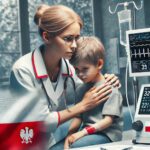Source: Velvin, G., Johnsen, V., Lidal, I.B. et al. Parental Intervention Program for Preschool children with Rare Diseases – a mixed methods evaluation of parents’ experiences and utility. Orphanet J Rare Dis 18, 327 (2023). https://doi.org/10.1186/s13023-023-02935-8
Although many children with rare diseases (RDs) face challenges in the educational sphere and parents play a decisive role in the transition from preschool to school, few studies have investigated the needs of parents of children with RDs and their potential to increase health knowledge and literacy to manage this transition process.
Rare Diseases
RDs are medical conditions that affect 1 in 2,000 individuals in Europe and are defined in the US as conditions that affect fewer than 200,000 people at any one time. It is estimated that there are approximately 7,000 different RDs, affecting between 18 and 30 million Europeans and 300 million people worldwide, many of whom are children. Approximately 72% of RDs have a genetic origin, and 70% begin in childhood. Notably, around 95% of RDs currently have no approved treatment, creating significant challenges for affected individuals and society as a whole. The impacts of RDs are often unexplored and range from psychological to physical symptoms, seriously compromising participation in education, work and everyday life.
Beware of children with DRs
Caring for children with RDs can be demanding and stressful, potentially intensified by the rarity of the condition. Children with RDs often have chronic and complex medical conditions that require multidisciplinary monitoring. The burden on parents has been reported to have a negative impact on their physical and psychological health and can cause practical and financial difficulties.
Rationale for the Study
Despite the great heterogeneity of the different RDs, parents seem to face many similar problems related to the rarity of the disease, such as lack of information and competence, limited clinical experiences and published research to inform school and interdisciplinary professionals, and lack of evidence-based practice. Lack of knowledge and information about the disease, its prognosis and children’s needs and development can pose challenges for both parents and school staff in facilitating appropriate adjustments as children begin their school journey.
Parental Intervention Program for Preschool Children with Rare Diseases
In Norway, both the National Health Services and the school system are public entities, with education being compulsory for all children between the ages of 6 and 16. TRS, a National Resource Center for Rare Diseases in Norway, developed the Parental Intervention Program for Preschool Children with Rare Diseases (PIPP-DRs) in 2002. The overall objective of PIPP-DRs is to increase parents’ health literacy and empower them to facilitate the transition from preschool to school, contributing to the improvement of school experiences and educational opportunities for children with DRs.
Study objective
The purpose of the article was twofold: (i) Evaluate parents’ experiences and perceptions when participating in the PIPP-DRs 10 and 11 months after the intervention, and (ii) discern elements of the intervention that appear to improve parents’ health literacy associated with their child’s transition from preschool to school.
Results
Participants reported that PIPP-DRs met their knowledge and information needs. They expressed strong approval for the content, organization and applicability of the program. Both the quantitative and qualitative findings suggest that the program was successful in empowering parents to advocate for their children’s needs.
Conclusion
This study suggests that parents of preschool children with RDs have unmet needs for information and knowledge about the possibilities and potential obstacles involved in
make your child’s transition to school easier. Programs similar to PIPP-DRs could be beneficial for other parents of children with DRs, as well as parents of children with other types of disabilities. Initiatives aimed at empowering the parents who took part in this study to navigate the school system competently are likely to generate equally favorable results. Preschool intervention programs, adapted for parents of children with RDs, should be further developed and researched in different cultural contexts and geographical regions.
What is the Parental Intervention Program for Preschool Children with Rare Diseases (PIPP-DRs)?
The Parental Intervention Program for Preschool Children with Rare Diseases (PIPP-DRs) is an innovative initiative developed in Norway to support parents of children with rare diseases (RDs) during the important transition from preschool to school. RDs are medical conditions that affect a small number of individuals, characterized by great diversity and complexity. Often, these conditions begin in childhood and can bring unique challenges to the educational development of affected children.
PIPP-DRs was created in response to the specific needs identified among parents of children with DRs. These parents face different challenges, including a lack of specific information about their children’s conditions and the need for guidance on how to support them in the transition to mainstream school. The program seeks to fill this gap by providing parents with the knowledge and skills to better support their children.
Program Structure and Content
PIPP-DRs is a four-day workshop specially designed for parents of preschool children with various DRs. The program is held annually and includes presentations by professionals on topics related to the education system, group discussions, practical advice sessions and workshops. The topics covered in the program range from pedagogical and psychological considerations to the social and emotional aspects associated with having a preschool child with RDs.
In addition, the program adopts a flipped classroom approach, with participants receiving online lectures two weeks before the workshop. This encourages parents to reflect on their information needs and the anticipated challenges associated with starting school.
Objectives of the PIPP-DRs
The main objective of PIPP-DRs is to increase parents’ health literacy and empower them to facilitate their children’s transition from preschool to school. This is accomplished by strengthening parents’ understanding of the school system, legal rights, accommodations and assistive devices, and strategies for effective communication and navigation in the school system.
Impact of the Program
The results of the program have been positive, with parents reporting increased understanding and competence in relation to their children’s school transition. They also indicated that they felt more prepared and relaxed after participating in the program. In addition, PIPP-DRs helped to develop more realistic expectations and improved communication skills for interacting with school staff.
Conclusion
PIPP-DRs is an example of an effective intervention that offers specific support to parents of children with DRs, addressing a critical aspect of their lives: their children’s education. By empowering parents with information and strategies to deal with the unique challenges that come with raising a child with a DR, the program not only benefits the children, but also contributes to the overall well-being of families. Programs like PIPP-DRs are essential to ensure that all children, regardless of their health conditions, have access to an inclusive, quality education.
Source: Velvin, G., Johnsen, V., Lidal, I.B. et al. Parental Intervention Program for Preschool children with Rare Diseases – a mixed methods evaluation of parents’ experiences and utility. Orphanet J Rare Dis 18, 327 (2023). https://doi.org/10.1186/s13023-023-02935-8
Este post também está disponível em: Português (Portuguese (Brazil))






